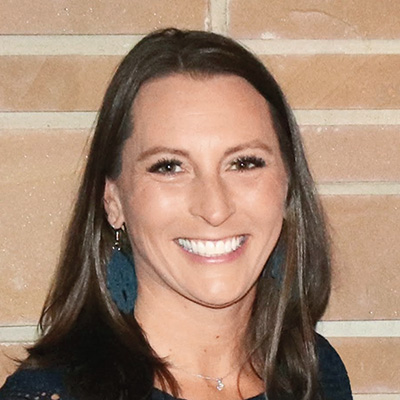An Unexpected Path to Patient Care
Jennifer Glonke Stewart applies the skills and mindset she developed as a Northwestern Engineering student and NCAA Division I athlete to lead a patient-centered approach to clinical research.
Jennifer Stewart (’04) balanced two demanding yet complementary roles at Northwestern: biomedical engineering undergraduate and student-athlete on the University’s softball team. In the lab, teamwork and communication were crucial for complex problem-solving. On the softball field, consistency, discipline, and adaptability helped build muscle memory to respond to split-second situations.
“In both places, I learned that making a little adjustment can translate into significant results,” Stewart says. “I learned to manage my time effectively—how to balance priorities, how to deliver even in a crunch, how to turn my focus on a dime.”
 Now, Stewart applies the same analytical, mid-game mindset as executive director of clinical data sciences at Premier Research, a clinical research, product development consulting, and clinical technology company that provides strategic solutions in oncology, neuroscience, immunology, and rare disease therapeutics, medical devices, and diagnostics. She leads a global team of nearly 200 data scientists that manages clinical trial data used by pharmaceutical, biotechnology, and MedTech clients to evaluate whether investigational treatments are safe and effective.
Now, Stewart applies the same analytical, mid-game mindset as executive director of clinical data sciences at Premier Research, a clinical research, product development consulting, and clinical technology company that provides strategic solutions in oncology, neuroscience, immunology, and rare disease therapeutics, medical devices, and diagnostics. She leads a global team of nearly 200 data scientists that manages clinical trial data used by pharmaceutical, biotechnology, and MedTech clients to evaluate whether investigational treatments are safe and effective.
As an undergraduate, clinical research wasn’t on Stewart’s radar. She had planned to practice medicine. Her adviser, professor Matthew Glucksberg, recommended she take the biomechanics and rehabilitation pathway in the biomedical engineering program. That led to a pivotal internship with T. George Hornby at the Rehabilitation Institute of Chicago (now the Shirley Ryan AbilityLab) where she collaborated on a team testing the efficacy of the Lokomat®, a rehabilitation robot designed to help patients recovering after stroke and spinal cord injury strengthen their muscles and improve their walking ability.
Success comes from surrounding yourself with brilliant minds and broad perspectives.Executive Director of Clinical Data Sciences, Premier Research
“The coursework I was taking in my undergraduate curriculum helped me understand the rigor of our research approach,” Stewart says. “We were focused on patient care while being very intentional about consistency, data validation, and quality control.”
The experience changed Stewart’s career trajectory, but not her commitment to patient care. Today, she gets goosebumps thinking about the long-term impact of her team’s work at Premier Research, recalling times when she’s heard from patients about how treatment changed their lives. “It’s meaningful to know that, even though I’m not hands-on treating a patient, I am having an impact on their journey,” Stewart says.
Grateful to her mentors for introducing her to alternative pathways, Stewart is committed to paying it forward, guiding students and early-career professionals and encouraging them to cast a wide net.
“Success comes from surrounding yourself with brilliant minds and broad perspectives,” Stewart says. “The decision you make today about what you’re studying will not force you into a narrow box in the future—the exact opposite. There are many options to build on the foundation of an engineering education, even if you’re not working as an engineer.”
A Storied Career
Following her softball career at Northwestern, Stewart continued to play competitive slowpitch softball for many years. In November 2024, she was inducted into the Illinois United States Specialty Sports Association Hall of Fame in recognition of her achievements. “Made to Order,” a slow-pitch team Stewart played on for nearly a decade, was also recognized as a 2024 Illinois USSSA Hall of Honor team.

